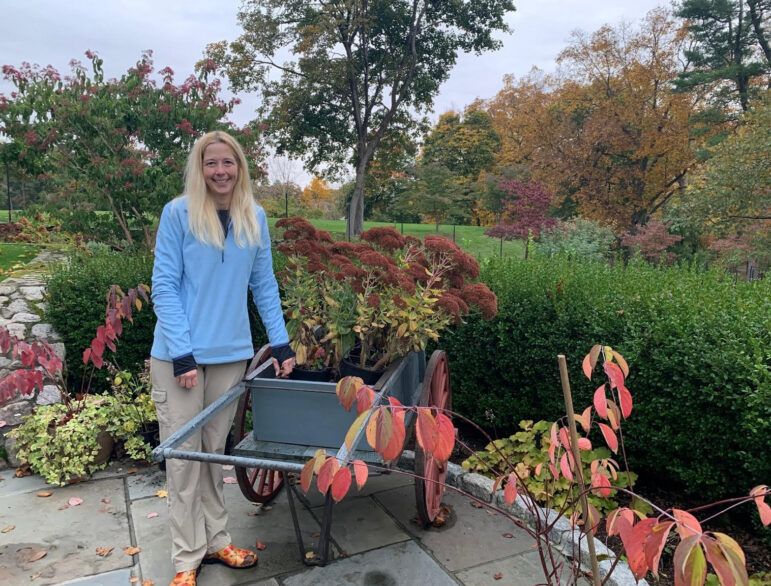By Myra Klockenbrink
Just when you think the long summer’s job of leaves on trees would be over, the real work begins. Ever since spring the leaves of our Town’s trees have been working hard to produce shade and cover, pushing out oxygen and soaking up carbon dioxide. In October they put on a month-long show of color. Now our yards are piled with fallen leaves ready for further service.

Diane Lampert, of Bringing the Greenback, a landscaping service in Greenwich, believes leaves are free money, literally falling from trees. “Blowing autumn leaves off your property is akin to blowing away money,” she said. “Leaves add value to our gardens as mulch and compost. Saving leaves saves money and supports birds and wildlife as a dividend!”
Local birds depend on the seed and insect larvae that collect in leaf litter, which serves as habitat for overwintering species of native bees. “Leaves build soil, conserve water and best of all, control weeds. By using leaves as your compost and mulch you are restoring nutrients to the soil that leaves used in order to grow,” said Lampert. “They’re like a bank account that never runs dry.”
Lampert has built a teaching garden at her home where she gives tours and propagates new plants for her business. She designed the garden around 14mature trees including towering white pines, northern red oaks and an allée of little-leaved lindens. She blows leaves off her driveway and back under her trees, gardening beds and into compost piles.
“As leaves decompose they become black gold enriching our soil,” she said. “Leaves improve the structure of the soil so that it can hold more water, reducing the need for irrigation, another savings.”
Lampert recommends keeping leaves on your property rather than having the Town cart them away. Leaves piled at curbside can be washed away and clog drains or pile in waterways where they decompose and overload waters with nutrients contributing to algal blooms in summer.
Taxpayers fund the collection and transport of leaves to Easton CT to
be composted. Residents do better to keep their leaves and the value
they yield on their own properties.
• Mow leaves directly into your lawn when damp and they’ll shred
easily. Leaves improve soil allowing lawns to absorb and hold water.
• Build soil under trees with leaves to protect tree roots from
temperature extremes while holding moisture.
• Mulch your garden beds with leaves and hold down weeds.
• Create healthier, more disease-resistant plants and turf with leaves. As they decompose they will release valuable nutrients into the soil.
• Keep leaves whole to avoid destroying butterfly eggs and chrysalis and hibernating bees.
• Start a leaf pile now. Corral your leaves with chicken wire fence to the equivalent of a four-foot cube. Add a few shovelfuls of soil and about 20-30 gallons of water to help them decay. In the spring pull the pile apart and spread into your flower beds and under your trees.
Free money.